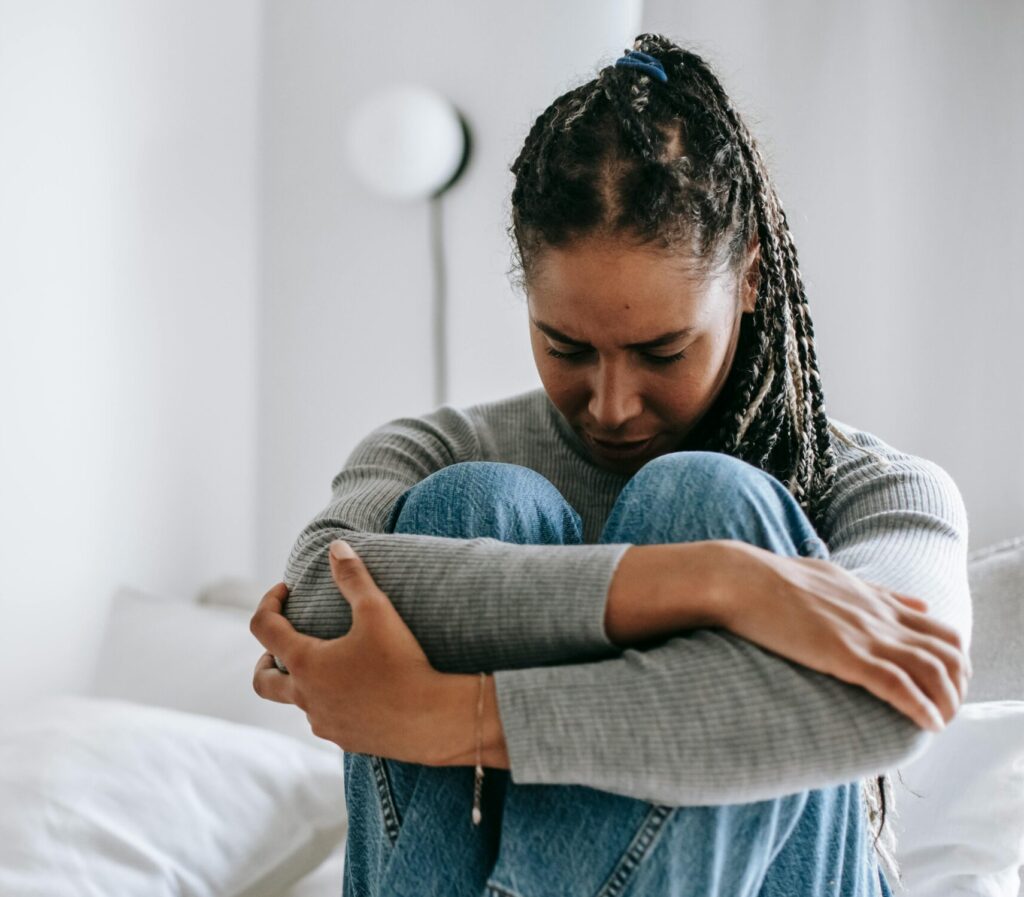Disclaimer: Not everyone who goes through menopause identifies as a woman and not all people who identify as women go through menopause. At Jayla, our core audience is people who identify as women, so we primarily use the word “women.” However, we’re working on specific content for people going through menopause who might not identify as women. Inclusivity is a key value of ours, so bear with us!
How Do I Know Perimenopause is Ending?
Your period has become more and more scarce, you feel like you’re approaching postmenopause, but you’re not quite sure.
“What should I even expect after menopause?” You’re a bit nervous because you’re unsure what’s coming…
Don’t worry – we’re here to help you out with the knowledge you need.
Frequently Asked Questions About Reaching Menopause
First off, let’s address the most common questions about the end of perimenopause before we delve into the details.
Do symptoms end once we reach postmenopause?
Menopause is actually a moment in time. It’s the moment when you’ve gone 12 consecutive months without a period (1). Now, while menopause is a very specific point, symptoms don’t suddenly end after this point (unfortunately!).
The reality is that symptom evolution and changes are not clear-cut. We’ll cover what you can expect below, but every woman’s experience of menopause is unique. Some women suffer from more symptoms in early perimenopause, others in late perimenopause, and others in postmenopause. There is no “one size fits all.”
Nonetheless, there are indicators that you can be aware of – and that’s precisely what we’re here for!
Can symptoms start after menopause?
Yes, and it’s probably more common than you may think.
We have an illusion that when we hit menopause, all symptoms magically disappear. That’s often not the case. Our estrogen levels continue to decline postmenopause, which means that the symptoms associated with them also continue, though they may improve in some cases.
Late-onset symptoms are symptoms that show up or get worse well after you’ve hit menopause. Instead of appearing right away, they sneak up years later, often catching you off guard. These symptoms are usually linked to the long-term drop in hormone levels and the natural process of aging.
What if I’m nearly at menopause, but then my period shows up?
Has your period come for the first time in 11 months? So technically, you’re not yet postmenopausal, but you feel like you are?
This can be very frustrating: you’re essentially there, but medically speaking, not quite.
Menopause and its stages are not linear. That’s because menopausal symptoms don’t improve, worsen, or change on a totally predictable schedule. Just because you’re not technically postmenopausal doesn’t mean that the changes and symptoms you’re experiencing aren’t real.
If you’re experiencing new symptoms, find relief and seek help. We suggest speaking with a Jayla clinician with deep menopause expertise. Most importantly, try not to compare your experience to others.
Now: onto the meaty bit, and the telltale signs of perimenopause ending.
What is Perimenopause?
Perimenopause marks the beginning of our transition to menopause, often accompanied by physical and emotional symptoms (symptoms you may have previously classified as menopause symptoms). Hormones begin to fluctuate as our bodies prepare to stop menstruating. By extension, this also means our bodies are preparing to stop reproducing. Throughout perimenopause, our ovaries shrink and estrogen levels drop (1).
In the U.S., 85% of women report experiencing symptoms (2). However, it is very important to note that everyone is unique, and so is their menopausal experience. We keep saying that because it’s important. Perimenopause typically begins eight to 10 years before menopause and can start anywhere from your mid-30s to mid-50s, but most often begins in your early to mid-40s (3). The age at which you start perimenopause can be linked to genetics and can vary by ethnicity.
Signs Perimenopause is Ending
When perimenopause is winding down, your body might give you some pretty clear signs.
First, look out for changes in your menstrual cycle. You might notice your periods become even more irregular, with longer gaps between them (2). Eventually, they’ll stop altogether.
If you’ve gone a full year without a period, you’ve officially reached menopause!
On top of menstrual cycle changes, you may experience more intense symptoms when reaching the end of perimenopause. As our bodies adjust to and experience lower hormone levels, we might experience hot flashes and night sweats more frequently or intensely (2). Meanwhile, symptoms such as mood swings and headaches may lessen (2).
That may sound straightforward, but it’s often not as clear as it sounds. Hormonal fluctuations often don’t follow a straight path. However, hormonal testing can help determine what’s actually going on, to better understand your transition (2).
Transition to Postmenopause
As the name implies, postmenopause is the stage after menopause. As a reminder, menopause is technically the moment in time you’ve gone 12 consecutive months without a period.
The transition to postmenopause can be emotional – beyond the emotional symptoms that menopause sometimes comes with. Menopause signifies the end of fertility, which can be tough. We have grown up in a society that often places a woman’s value on her child-bearing ability. While these old-fashioned ideas are slowly but steadily changing, they can pop up and remain in society’s subconscious. It’s very understandable.
PSA: you’re worth much more than your fertility
Menopause can also mark change and aging, which may feel scary and filled with uncertainty. Today, we’re likely to spend a third of our lives in postmenopause (3). That can feel pretty anxiety-inducing.
However, by equipping yourself with knowledge and seeking relief for your symptoms, you can set yourself up to thrive during this period. It’s not easy, but we’ve got you.
What characterizes postmenopause?
Hormonally, your estrogen and progesterone levels stay low. This is different from perimenopause, during which hormone levels can be up one day and down the next – sometimes making us feel all over the place.
How do symptoms change during postmenopause?
This varies from woman to woman, and from symptom to symptom. Certain symptoms may continue after menopause, some may steadily disappear, and others may surface for the first time.
Continuing symptoms during postmenopause
Some symptoms you experienced in perimenopause may stick around after you’ve entered postmenopause.
Hot flashes: Hot flashes are a symptom that can continue during postmenopause (5). For certain women, it’s only for one year after menopause, while others experience them randomly after, and for some, hot flashes can last up to 10 years (5, 6). For a tiny portion of women, hot flashes may never go away (6).
Sleep disruption: Thirty-five to 60% of postmenopausal women struggle with sleep (7). This can be related to menopausal symptoms, such as night sweats, insomnia, and anxiety. However, it can also be related to aging (8).
Mood swings: During postmenopause, some women go through mood swings, anxiety, and even depression. It can be triggered by stress, changes in relationships, or just life throwing curveballs at you, on top of the hormonal changes you’re experiencing (5).
Don’t forget – these are the most common postmenopausal symptoms, but you may be experiencing something else, and that could be totally natural too.
Consider speaking with a Jayla clinician to learn more.
New symptoms after menopause
During postmenopause, you might also notice new symptoms emerging. These can include vaginal dryness, bone density loss, and changes in your skin and hair.
While some of us may have already started experiencing these symptoms in perimenopause, they can pop up as new symptoms after menopause too, or may simply become noticeable only then.
Vaginal dryness (5)
Vaginal dryness happens because the body produces less estrogen, which normally keeps the vaginal tissues lubricated and elastic. Without as much estrogen around, those tissues can become thinner, less flexible, and more prone to irritation. This can make sex uncomfortable or even painful for some women, and it can also increase the risk of urinary tract infections.
Use lubricants, and consider vaginal estrogen therapy, or even hormone replacement therapy (HRT) for relief.
Hair loss and skin dryness, irritation, and itchiness
You may notice your hair starting to thin or fall out more than usual once you hit menopause. Blame it on those hormone shifts—lower estrogen levels can affect hair growth cycles. It might feel frustrating, but it’s common during this stage.
Similarly, you might notice your skin feeling drier, thinner, or even more sensitive than before. Again, it’s those hormone changes at play. Estrogen helps keep skin plump and hydrated, so with less of it around, your skin can lose some of its elasticity and moisture.
Postmenopause long-term health considerations
Generally speaking, decreased estrogen may increase your risk of certain health conditions, because the hormone is key to fighting them. It’s important to be aware of this and take good care of yourself.
Reduced bone density (5)
After menopause, your bone health can become a bit more fragile. Estrogen is pretty crucial for keeping your bones strong and healthy. When those levels dip, your bones can start losing density faster than before. This makes them more brittle and prone to fractures.
Now, this doesn’t mean you’re going to break a bone just by sneezing, but it does mean you’ve got to be a bit more careful. Consider taking supplements like calcium and vitamin D supplements—they help keep your bones strong. Staying active, especially with weight-bearing exercises, can also help too.
Heart health (5)
Onto your heart. Estrogen also does some good things for your ticker, like helping keep your blood vessels relaxed and your cholesterol levels in check. Without as much estrogen, your risk for heart disease can creep up.
Eating a heart-healthy diet—think lots of fruits, veggies, and lean proteins—can make a big difference. Staying active, even with gentle exercises like swimming or yoga, can also keep your heart strong.
Taking care of your long-term health after menopause is all about staying informed and making smart choices. With a little TLC for your bones and heart, you can keep feeling strong and healthy for years to come.
Hormone Testing May Be The Key
If you’re unsure or confused about which stage of menopause you’re at, don’t worry!
Hormone testing can help you understand what stage of perimenopause you’re at, by testing your follicle-stimulating hormone (FSH) (3). Pairing hormone testing with a visit to a clinician specializing in menopause care can help you determine your perimenopausal stage.
Follicle-stimulating hormone, or FSH, is a hormone that plays a crucial role in the reproductive processes of both men and women. In women, FSH helps control the menstrual cycle and stimulates the growth of eggs in the ovaries.
The Jayla Menopause Kit provides five at-home testing sticks to measure your FSH levels every other day for nine days. You’ll log your results and book a free telehealth consultation with one of our menopause clinicians. Our clinicians will be able to give you an idea of which stage of menopause you’re in, and help you find relevant relief for the menopausal symptoms you’re experiencing!
You don’t have to “suffer through” menopause.
References
- The menopause years (2018) ACOG. Available at: Source (Accessed: 13 June 2024).
- Koeppel, K. (2023) Signs perimenopause is ending, Aging.com. Available at: Source (Accessed: 07 July 2024).
- How Do I Know When I’m in Menopause? (no date) The North American Menopause Society (NAMS). Available at: Source (Accessed: 07 July 2024).
- How Gaps in Research Lead to Gaps in Care for Aging Women. Harvard Medical School. Available at: Source
- (2021) Postmenopause: Signs, symptoms & what to expect, Cleveland Clinic. Available at: Source (Accessed: 07 July 2024).
- Menopause FAQS: Hot Flashes (no date) Menopause FAQS: Hot flashes. Available at: Source (Accessed: 07 July 2024).
- Jehan, S. et al. (2015) Sleep disorders in postmenopausal women, Journal of sleep disorders & therapy. Available at: Source (Accessed: 07 July 2024).
- Postmenopause: Impact on weight, hot flashes, and more (no date) Medical News Today. Available at: Source (Accessed: 07 July 2024).



